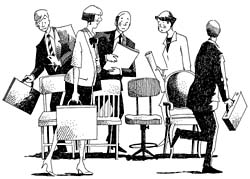Democrat - January-February 2010 (Number 116)
How the EU Operates - after Lisbon
Here a President, there a President
and another two...

There is confusion at the top of the EU now the Lisbon Treaty is in place. With few fanfares a permanent EU President has been appointed, a nobody so as not to draw attention to this new post.
In a parallel appointment a compliant inexperienced ‘yes’ lady has been made the EU Foreign Secretary and miscalled the High Representative.
Spain is the current Member State responsible for running things in the rotating system so currently chairs all but one of the Councils of Ministers.
European Council
The European Council consists of heads of state or prime ministers and holds EU summits at least twice every six months and is chaired by the rotating presidency. The new EU President attends the Council as a full member.
The Council appoints the EU President and the Foreign Secretary.
There is also the President of the Commission who chairs the secret meetings of the unelected 27 Commissioners. The EU Foreign minister is a Vice President of the Commission.
There is yet a further President in the form of the President of the European Parliament who chairs plenary meetings of this assembly.
That is a total of four Presidents and all of us were told that the Lisbon Treaty and before it the European Constitution were to simplify things! So, who is doing what?
Council of Ministers
The various Councils of Ministers consisting of 27 ministers from national governments of the Member States and cover different portfolios of agriculture, transport or home affairs and so on. These will be chaired by the Member State holding the rotating presidency.
An exception to this practice is where the High Representative for Foreign Affairs and Security chairs the Council of Foreign Secretaries and not the rotating presidency.
Under the Lisbon Treaty the committee known as the Troika has continued and consists of the High Representative for Foreign affairs, the Foreign Secretary of the rotating presidency and the Commissioner for foreign affairs. These three can call upon the foreign secretary of the next rotating presidency. The Troika deals with foreign policy issues and so rules out any influence from the 26 Member States not represented.
Who do I contact?
Meanwhile alluding to an alleged quip by Henry Kissenger as to who he should telephone, Commission President Mr Barroso has indicated that while US Secretary of State Ms Clinton may have someone to call, it will not always be clear who foreign leaders should reach out to in the EU to find an interlocutor at their own level. In referring to "other matters" he noted that the EU is "a union of states, so by definition [its] system is more complex."
He further indicated that sometimes he will be the one to call and sometimes it will be the newly appointed EU President Herman Van Rompuy, who will also represent the EU in common foreign and security policy.
Some people do not understand the concept of supranational institutions, said Mr Barroso, "but we will keep on explaining to them."
How much does it cost?
Leaked EU documents obtained by Open Europe, reveal that the EU President Mr Van Rompuy will earn £320,000, making him the highest paid leader in the western world, earning more than US President Barack Obama, and will pay just 25 percent income tax. He will have a staff of 22 press officers, assistants and administrators and a further 10 security agents. The EU President will have access to a £5million reserve fund to dip into as his job "develops".
European Commission pay
In 2004 Commissioners received a salary of £195,000, and Vice Presidents £217,000. In answer to a question put by MEPs in 2009 the Commission President receives £270,000 and £45,000 expenses and entertainment. On retirement the Commission President will for three years be given £171,000 per year.
Conclusions
The actual title of EU Foreign Minister was dropped after the European Constitution was rejected by the French and Dutch electorates along with the EU flag and word “federalism”. This was just part of the plan to head off further opposition to the Constitution.
However, in practise the permanent EU President and Foreign Secretary are in position at the head of the Euro-federalist government in Brussels. Neither of them are elected nor can they be thrown out of office.
The Commissioners are appointed by the European Council with currently one Commissioner per member State. They cannot be thrown out of office except as a whole by the European Parliament. This power was exercised once in 1999 forcing the whole Santer Commission to resign because of corruption charges.
The super-high salaries ensure they all keep to the line agreed in secret. By any standards the whole structure is totally undemocratic and will be held together with sticking plaster and chewing gum to keep the show on the road and present to the world a united front.